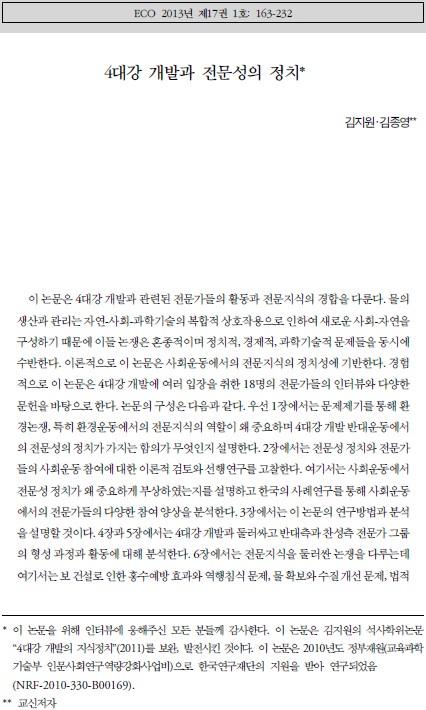
| Title |
: The Four Major Rivers Restoration Project and the Politics of Expertise |
| Date |
: 2013. 6. |
| Journal title |
: ECO |
| Author |
: Jiwon Kim, Jongyoung Kim |
| Contact us |
: csts@khu.ac.kr |
| Abstract |
: This paper examines experts’ activities and their contested knowledge productions in the Four Major Rivers Restoration Project. Because water governance involves complex interactions among nature, society, and techno-science, the contestations include political, economical, and scientific problems simultaneously. Theoretically, this paper is based upon expertise studies and social movement studies to understand the political nature of expert knowledge. Empirically, this paper draws on 18 in-depth interviews with experts who have participated in the project in various ways. The paper is composed of the following sections. In the first section, we introduce our research question concerning why we studied experts’ activities and roles in the project, explaining the importance of science’s role in environmental controversies. In the second section, we undertake literature reviews of the politics of expertise and its role in social movements. We also explain why the politics of expertise emerges as a central problem in contemporary social movements and introduce sample case studies set in Korea that analyze experts’ diverse modes of participation. In the third section, we discuss our research methods. In the fourth and fifth sections, we describe how experts supporting and opposing the Four Major Rivers Restoration Project emerged or were recruited, and we examine their roles and activities. In the sixth section, we examine the contestations of expert knowledge in five areas: (1) the dams’ effectiveness for flood control and the safety of the dams themselves, (2) water security and water pollution problems, (3) legal problems, (4) economic issues, and (5) effects of the project on the ecosystem. In discussion, we argue that the contests between experts concerning the project can be understood as a conflict between an alliance of bureaucratic knowledge and an alliance of oppositional knowledge. In conclusion, the politics of expertise in this case simultaneously raises substantial techno-scientific and legal questions that eventually threatened to fracture relations between the state and experts on water governance.
Click the following link for downloading the article: http://www.dbpia.co.kr/Article/3213692 |
|

